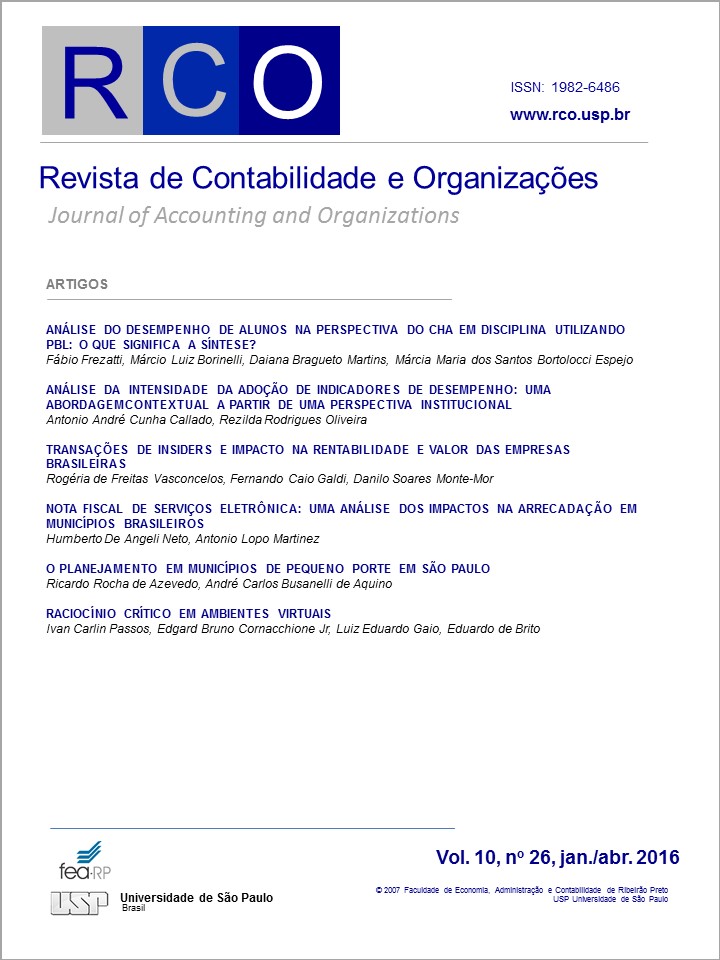CRITICAL THINKING IN VIRTUAL ENVIRONMENTS
DOI:
https://doi.org/10.11606/rco.v10i26.111420Keywords:
Critical thinking, Accounting education, Virtual learning environmentAbstract
In recent years Brazil has been occupying a position of economic prominence in the world, but it is not the same when it comes to quality of education, both at the basic and higher levels. The new generations born in the Digital Age, such as “Generation Y” or Generation “Z”, have several qualities, but among their deficiencies, they are worried about worshiping technologies that compete with other activities that develop critical thinking, such as reading and problem solving. The critical thinking skill (critical thinking) is emphasized as important for many types of practitioners and has been researched for many years. The general objective of this research was to empirically evaluate the application of Richard Paul's Critical thinking development model in the Moodle virtual environment with students of accounting disciplines. A quasi-experiment was applied in the first semester of 2013 to undergraduate students in administration in the discipline of Business Budget and Comptrollership of a Higher Education Institution in the interior of the state of São Paulo. The critical thinking tool was the Ennis Weir Critical Thinking Essay Test (EWCTET). The main result was that the Richard Paul model did not have a significant effect on the development of critical thinking skills when applied in a mixed approach and through a Moodle virtual learning environment, contrary to previous research. For future research, larger samples are suggested to improve the statistical power of the results and the investigation of forms of control that intensify the students’ time dedicated to asynchronous activities.
Downloads
Downloads
Published
Issue
Section
License
The RCO adopts the Free Open Access policy, under the standard Creative Commons agreement (CC BY-NC-ND 4.0). The agreement provides that:
- Submission of text authorizes its publication and implies commitment that the same material is not being submitted to another journal. The original is considered definitive.
- Authors retain the copyright and grant the journal the right of first publication, with the work simultaneously licensed under the Creative Commons Attribution License which allows the sharing of the work with acknowledgment of authorship and initial publication in this journal.
- Authors are authorized to take additional contracts separately, for non-exclusive distribution of the version of the work published in this journal (e.g. publish in an institutional repository or as a book chapter), with necessary recognition of authorship and initial publication in this journal.
- Authors are allowed and encouraged to publish and distribute their work online (e.g. in institutional repositories or on their personal page) before or during the editorial process, as this can generate productive changes as well as increase the impact and citation of published work (See The Effect of Free Access).
- The journal does not pay copyright to the authors of the published texts.
- The journal's copyright holder, except those already agreed in the Free Open Access Agreement (CC BY-NC-ND 4.0), is the Accounting Department of the Faculty of Economics, Administration and Accounting of Ribeirão Preto of the University of São Paulo.
No submission or publication fees are charged.
Up to 4 authors per article are accepted. Exceptionally duly justified cases may be reviewed by the Executive Committee of the RCO. Exceptional cases are considered as: multi-institutional projects; manuscripts resulting from the collaboration of research groups; or involving large teams for evidence collection, construction of primary data, and comparative experiments.
It is recommended that the authorship be ordered by contribution of each of the individuals listed as authors, especially in the design and planning of the research project, in obtaining or analyzing and interpreting data, and writing. Authors must declare the actual contributions of each author, filling the letter to the editor, at the beginning of the submission, taking responsibility for the information given.
Authors are allowed to change throughout the evaluation process and prior to the publication of the manuscript. The Authors should indicate the composition and final order of authorship in the document signed by all those involved when accepted for publication. If the composition and authoring order is different than previously reported in the system, all previously listed authors should be in agreement.
In the case of identification of authorship without merit or contribution (ghost, guest or gift authorship), the RCO follows the procedure recommended by COPE.








